Wrapping Up Reeling 2025
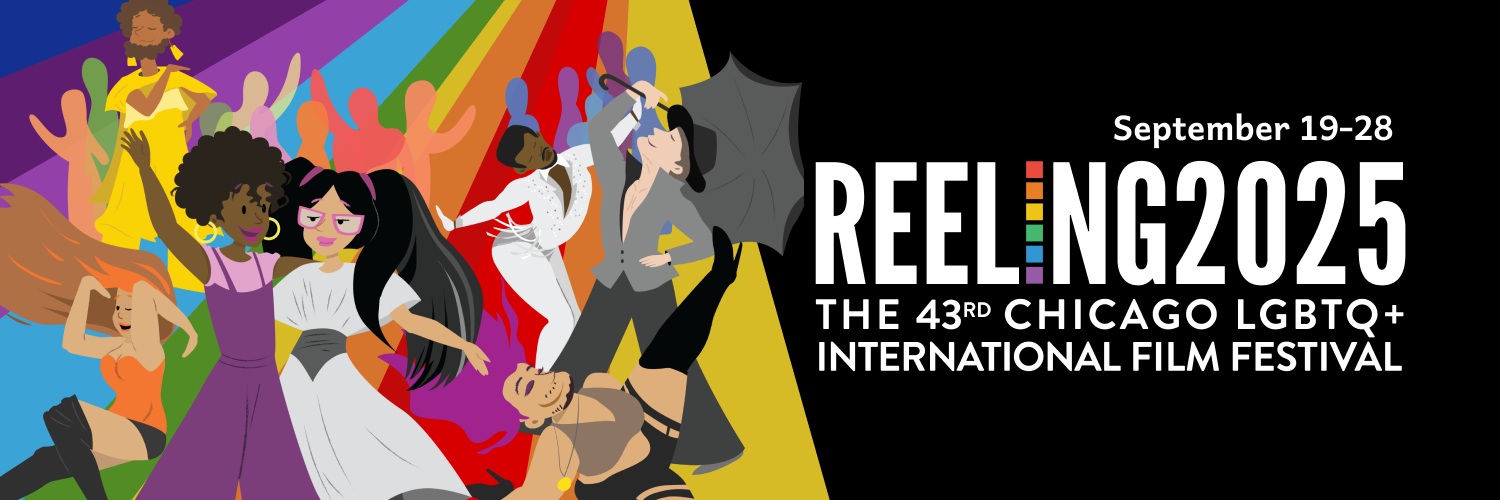
The 43rd annual edition of Chicago’s Reeling International LGBTQ+ Film Festival [https://reelingfilmfest.org/] is now in the books, having featured an array of narrative, documentary and short films. The festival’s lineup was something of a mixed bag compared to past years, almost as if the glass were half full or half empty, depending on one’s perspective. In all, I managed to catch 10 films during the festival’s 10-day run. So, with that said, here’s my take on what I watched and what I thought.

“Lakeview” (Canada) (5/5); Letterboxd (5/5), Imdb.com (10/10), TMDB.com (10/10), Imdb.com critics review; Web site, Trailer
Friendships are one of the greatest treasures of the human experience. They can provide us with tremendous joy and fulfillment. But they can also come with frustration and heartache, especially if feelings of betrayal or disillusionment enter the picture or if we find ourselves having to go to extraordinary lengths to maintain the connection, evoking the love-hate relationship they sometimes carry with them. In the end, though, we generally discover that the effort we put into them is more than worth it, particularly at those times when we gather en masse to celebrate their innate splendor. Such is the case in writer-director Tara Thorne’s second feature outing, an intensely personal comedy-drama about a weekend reunion of seven dear friends. The occasion? Darcy (Lesley Smith), a middle-aged, well-to-do self-described “baroness,” invites six friends to her Nova Scotia lakefront home to celebrate her divorce, a time to say good riddance to her past and a warm welcome to what she hopes will be a new and more satisfying future. Joining Darcy are her longtime friend Lauren (Nicole Steeves) and her sweet but flirtatious young girlfriend, Phoebe (Faly Mevamanana); long-tenured couple Julien (Kathryn McCormack) and Julie Anne (Stephanie Clark), who have a big announcement of their own; Lucy (Jessica Marie Brown), whose irresponsible, cheating partner abandons her just as they were about to leave for the weekend’s festivities, prompting the inconsolable, newly jilted romantic castaway to embark on a protracted bender to drown her sorrows; and Dax (Hilary Adams), a successful, self-absorbed, unrepentantly promiscuous recording artist who goes through women faster than free pizza at a happy hour buffet (including, at different points in the past, with most of the attendees at Darcy’s celebration). Their weekend together consists of an array of antics in which the guests engage in a series of candid and profound yet often-sassy conversations about life, love, regrets, relationships, and, above all, friendships (with or without benefits). This delightfully engaging tale is peppered with snappy one-liners (many of which were brilliantly ad libbed) and razor-sharp observations scattered throughout a plethora of outrageous and unexpected plot developments (think of this essentially as an all-lesbian version of “The Big Chill” (1983) or “Return of the Secaucus Seven” (1979)). This is all brought to life with a smartly written screenplay, some of the best movie casting I’ve ever seen, spot-on character development and chemistry, and an excellent soundtrack with knock-out performances of original songs whose sentiments are perfectly coordinated with the narrative’s subject matter. “Lakeview” is a truly impressive entry in the filmography of contemporary LGBTQ+ cinema and my top pick for best release at Reeling, an enjoyable, heartfelt offering that comes as a genuinely wonderful surprise, not just in its own genre, but in the world of movies overall. Give this one a look, not just for its entertainment value, but as an inspired, insightful exploration of the relationships we hold most dear. Indeed, you may never look at your friends the same way ever again.
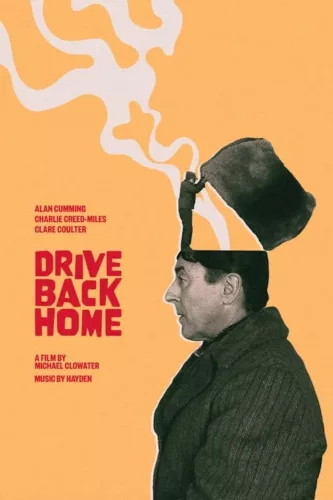
“Drive Back Home” (Canada) (5/5); Letterboxd (4.5/5), Imdb.com (9/10), TMDB.com (9/10), Imdb.com critics review; Web site, Trailer
Road trip/buddy movies are one of my favorite film genres, primarily because of the myriad possibilities they afford for pairing up unlikely traveling companions journeying together under diverse, unexpected and often-outlandish conditions. And, when filmmakers figure out how to make the most out of these scenarios, their finished products are often entertaining, enlightening, and, above all, engaging. That’s very much the case with writer-director Michael Clowater’s debut feature, an insightful, sensitive, funny and touching story of two very different brothers on an unanticipated road trip through Eastern Canada. In this fact-based story set in 1970, Weldon (Charlie Creed-Miles), a cantankerous, blue collar plumber from small town New Brunswick, learns that his long-estranged gay brother, Perley (Alan Cumming), has been arrested on a morals charge for public indecency in Toronto. Authorities offer Weldon an opportunity to bail out his sibling, with all charges dropped, as long as he agrees to retrieve him and return him to his rustic, far-removed hometown, essentially taking him off the hands of the local police. However, the alternative, if Weldon declines the offer, is a five-year jail sentence for Perley, an outcome he has difficulty justifying, especially when his spry, elderly mother (Clare Coulter) assertively shames him into rescuing her baby, a request driven by her desire to make amends for regrettable events tied to the family’s past. Despite his obvious discomfort with the nature of this venture, not to mention the many inherent inconveniences involved in this 1,000-mile road trip in an old, unreliable pickup truck, Weldon relents and makes the drive to the big city to collect his brother. And, after a somewhat adversarial reunion, they set out on the return trip to their collective roots, a prospect Perley doesn’t particularly relish for a variety of reasons. Their challenge-filled journey is subsequently filled with a series of ups and downs, laughs and arguments, and more than a few recollections and revelations, developments that test the relationship of the two mismatched siblings. But, these conditions aside, the result is a tender, redemptive, sometimes-trying reconciliation as they make their way back to New Brunswick and a very uncertain future. While a few of the sequences are a tad stretched out, they nearly always achieve their intended objectives, providing viewers with an involving, delightfully whimsical but sometimes-dark tale that’s sure to please, tug at the heartstrings, and shine a bright light on their respective issues, failings and awakenings. This is made possible to a great extent by the outstanding performances and character development of the two leads, whose deftly developed chemistry feels completely natural and never forced. But, perhaps most importantly, as with most successful road trip films, “Drive Back Home” effectively shows how disparate personalities can grow conciliatory, evolving over time through an eventful shared experience, even among those who start out with differing, even antagonistic, outlooks on one other’s lives and circumstances. This release is one of the best offerings to come out of this year’s Reeling Festival, a movie undeniably worth one’s time.
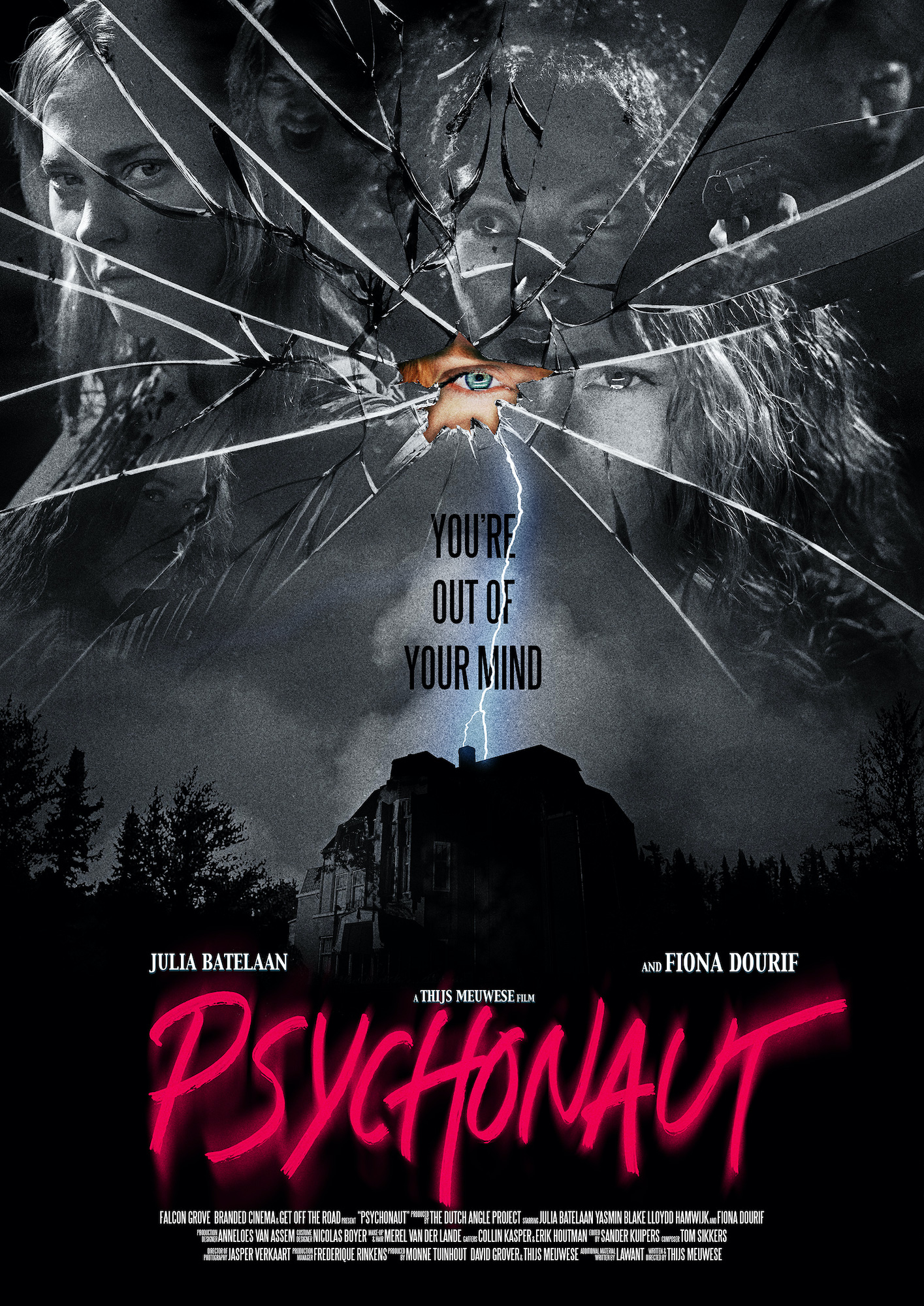
“Psychonaut” (Netherlands) (5/5); Letterboxd (4.5/5), Imdb.com (9/10), TMDB.com (9/10), Imdb.com critics review; Web site, Trailer
Imagine a film that’s capable of moving the needle forward in multiple genres simultaneously. If you can picture that, then you owe it to yourself to see this imaginative, impressive third feature from writer-director Thijs Meuwese, an offering that effectively advances smart horror and LGBTQ+ cinema at the same time. In this dark futuristic tale, when an accidental shooting leaves Dylan (Yasmin Blake) fighting for her life from a severe head wound, her girlfriend, Maxime (Julia Batelaan), desperately looks for a way to save her. But, rather than take Dylan to a hospital, Maxime drives her to the home of her estranged mother, Samantha (Fiona Dourif), an alternative physician who employs a special diagnostic and treatment device for healing the sick and injured. However, when Dylan is hooked up to the equipment, Maxime and Samantha discover that the outlook is bleak unless they can help Dylan isolate an essential root memory that can be tapped by the device to rewrite the wiring of the injured portions of her brain, a tactic that’s hoped will restore her to full health. Despite the promise of this treatment, though, the question remains, what constitutes that essential memory and how can it be found? That’s the task Maxime undertakes when she electronically links her psyche with Dylan’s in an effort to locate the elusive memory that will enable her recovery. What follows is a surreal psychological odyssey in which Maxime and Dylan explore their minds together to find what they’re looking for. The result is a seamless fusion of past experiences and present forensic investigation, a journey that reveals more than either of them expected, including revelations about themselves and their relationship, Maxime’s longstanding troubled connection with her mother, and how their collective current circumstances have turned out as they have, much of which surprisingly has little to do with the shooting, the catalyst that launched this epic internal adventure. The filmmaker thus leads viewers on a captivating saga that successfully blends a variety of mesmerizing elements, masterfully edited without missing a beat, including through the unexpected plot twists that pop up along the way. This dazzling journey is further enhanced by its gorgeous cinematography (shot largely in a captivating mix of black, white and red) and an inventively detailed production design, including its quasi-Gothic sets and thoughtfully chosen background elements. And, thankfully, unlike many other contemporary psychological thrillers, the film doesn’t overstay its welcome, skillfully telling its tale with an economic 1:27:00 runtime, getting in, getting out and including no unnecessary filler or padding. What’s most notable, though, is the filmmaker’s uncanny knack for presenting a horror film that goes beyond trite tried-and-true tropes, as well as an LGBTQ+ storyline that pushes the envelope compared to most typical narratives in this genre, and effectively does so for both in one film. That’s quite an accomplishment, one worthy of high praise. Admittedly, there are a few times when this release verges on being a little too clever for its own good, but those instances are hardly worth mentioning in the wake of everything else it has to offer. “Psychonaut” is a sleeper that truly deserves an audience, especially for fans of films in either of these categories, a release that delivers brilliantly on both fronts.
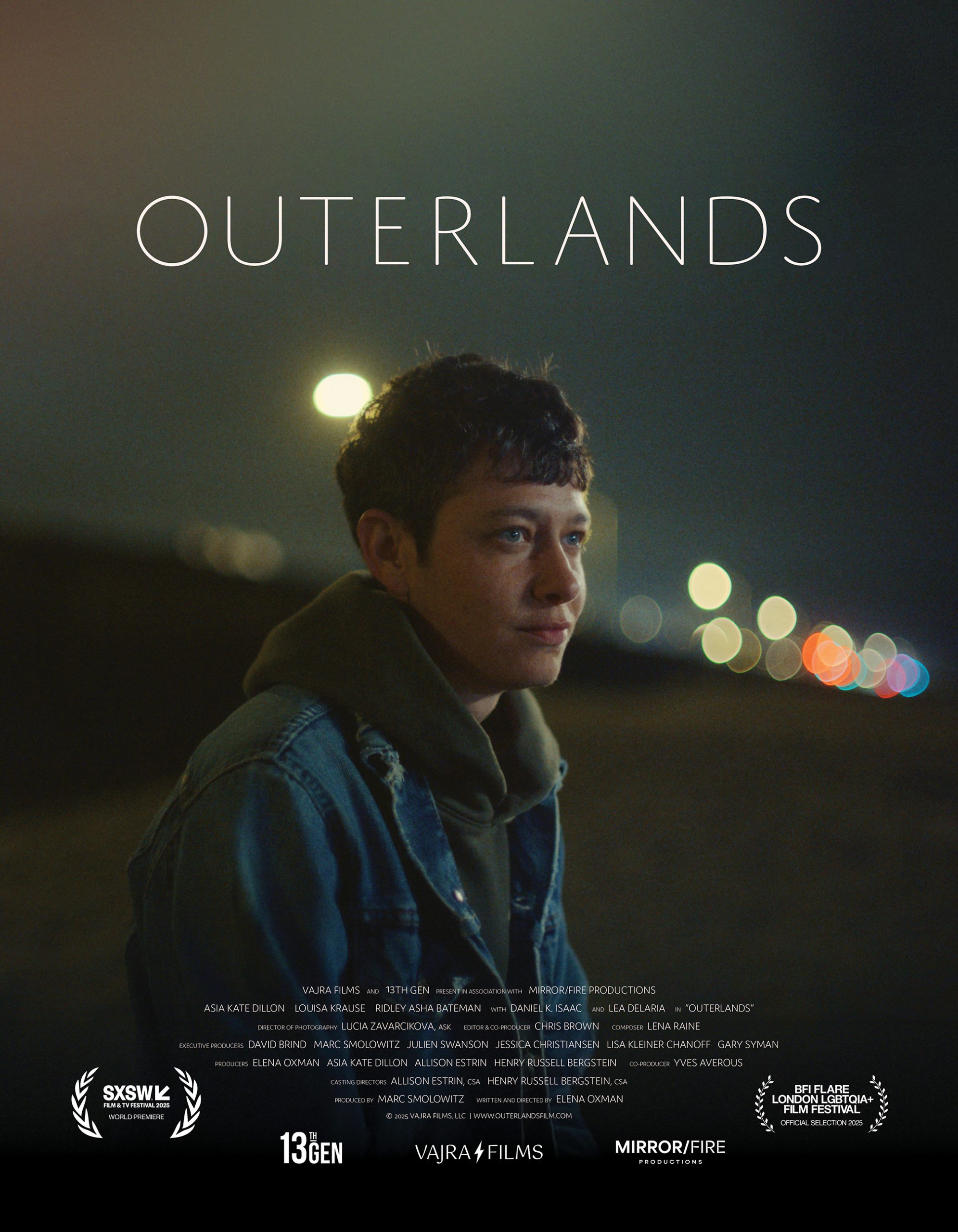
“Outerlands” (USA) (4/5); Letterboxd (3.5/5), Imdb.com (7/10), TMDB.com (7/10), Imdb.com critics review; Web site, Trailer
With all of the attention that’s been focused on transgender issues in recent years, the number of films that have focused on this segment of the LGBTQ+ community is still relatively limited when compared to its other counterparts in this cinematic genre. However, one would hope that writer-director Elena Oxman’s debut feature is a step in the right direction for raising awareness and recognition of cinematic offerings in the transgender community, a constituency that has been increasingly looking to distinguish itself in various ways from those in gay, lesbian and bisexual circles. This simple but sensitive release follows the life of Cass (formerly Cassie) Marks (Asia Kate Dillon), a restaurant server and part-time child care provider seeking to make a fresh start in San Francisco after a troubling upbringing in Michigan, one characterized by parental abandonment, questions about gender identity and eventually substance abuse. While working at one of the Bay Area’s upscale eateries, Cass befriends a co-worker, Kalli (Louisa Krause), a single mother who asks Cass to look after her 12-year-old daughter, Ari (Ridley Asha Bateman), when she’s called out of town for a short business trip related to her emerging clothing design company. Cass agrees, expecting the caregiving assignment to last only a few days. But, as time passes and Kalli doesn’t return any of Cass’s numerous voicemail messages, questions arise about whether Ari has effectively been abandoned, a development that troubles Cass, particularly for the memories it evokes about what Cassie’s youth was like. This is far from what Cass was expecting, and it only adds to the list of many issues to be addressed in successfully starting a new life. So what is Cass to do in the wake of this unexpected incident? That’s the key question that drives the narrative as it unfolds. And, in telling this story, the filmmaker capably keeps viewers sufficiently off-balance when it comes to figuring out the direction in which events are headed, essentially placing audiences in the protagonist’s shoes in sorting everything out. This is realized through an engaging script filled with a deftly compiled selection of quandaries, backed by fine performances, a pervasive air of mystery, and gentle, fittingly implemented comic relief. The film also features a cinematic panorama of San Francisco, including views of many seldom-seen areas of the city, and embellished by an atmospheric original score. Admittedly, the pacing could stand to be a little brisker at times, but, if that were to be overdone, it would likely undercut the prevailing sense of uncertainty that the filmmaker was going for in characterizing Cass’s mindset. “Outerlands” represents a decidedly commendable entry in the annals of transgender cinema, as well as an auspicious start to this new director’s feature film repertoire, one that, hopefully, will be reflected in future movie projects for years to come.
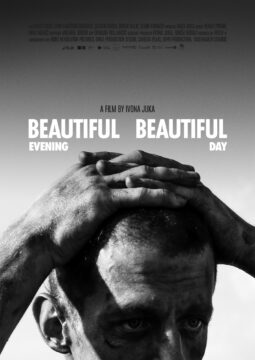
“Beautiful Evening, Beautiful Day” (“Lijepa vecer, lijep dan”) (Croatia/Canada/Bosnia-Herzegovina/Poland/Cyprus) (3/5); Letterboxd (3/5), Imdb.com (6/10), TMDB.com (6/10), Imdb.com critics review; Web site, Trailer
When a filmmaker comes up with a good idea for a movie, it’s essential to make sure that all of the key elements are in place when production begins and that carry through into the finished product. This is particularly true for nailing the items intended to have the most impact and eliminating the flotsam that can clutter the final cut. But, in the case of writer-director Ivona Juka’s third feature outing, the filmmaker only gets the formula half right. Without a doubt, Juka scores big on the high-impact material, but the completed work truly could have used another round of script revisions and ruthless film editing to chop out the extraneous material linking these sequences, dead weight that often tends to sink the flow of the picture like an overloaded hammock. This release follows the lives of Yugoslavian director Lovro Horvat (Dado Cosic) and screenwriter Nenad Milicic (Djordje Galic), partners in filmmaking and in life who distinguished themselves as defenders of their homeland during World War II. However, as much as they might like to believe that their combat heroics have insulated them against criticism for their gay lifestyle, they come under growing scrutiny in the 1950s when they attempt to make pictures that are seen as going against the socialist dogma of Yugoslavian leader Marshal Tito. And their “deviant” lifestyle – including alternative “shameful” sexuality, a love of Western music and banned books, and an erroneous belief in the existence of free thinking in this allegedly democratic society – provides precisely the kind of trumped up motivation the government needs to surveil them as suspects for traitorous behavior, their heroic wartime accomplishments notwithstanding. Given this context, the story mixes political intrigue and covert spying with tender romantic moments and unforgivably brutal treatment at the hands of merciless official operatives. And it’s in those high-impact moments of warm, loving romance, passionate sexuality, and explicit inhumanity where the director succeeds in making genuinely bold visual and thematic statements, holding nothing back in doing so (sensitive viewers take note for the graphic nature of these depictions). But the in-between moments are when the picture falls decidedly flat, incorporating material that adds little to the narrative and slowing the pace significantly. That’s unfortunate given its otherwise-impressive production values, including strong performances, stunning black-and-white cinematography, a carefully crafted production design, a hauntingly emotive original score and an aptly programmed complementary soundtrack. It also astutely re-creates the exaggerated, albeit unwitting campiness of Yugoslav propaganda films of the era, the kinds of pictures that Horvat and Milicic are relegated to making when their own projects are sidelined for their “inappropriate” content. These assets, however, are not enough to overcome the deficiencies in the picture’s screenplay and film editing (especially the many redundancies in each of these areas), qualities that detract from this offering’s overall quality. Regrettably, these shortcomings get in the way of telling an important (and troubling) tale, one that’s not widely known and that has an eerie relevance in light of recent developments regarding the future of the LGBTQ+ community, not only in the setting of this story, but elsewhere as well. Sadly, acceptance often carries a cost, one that we all need to be aware of through vehicles that make this indisputably clear before it’s too late.
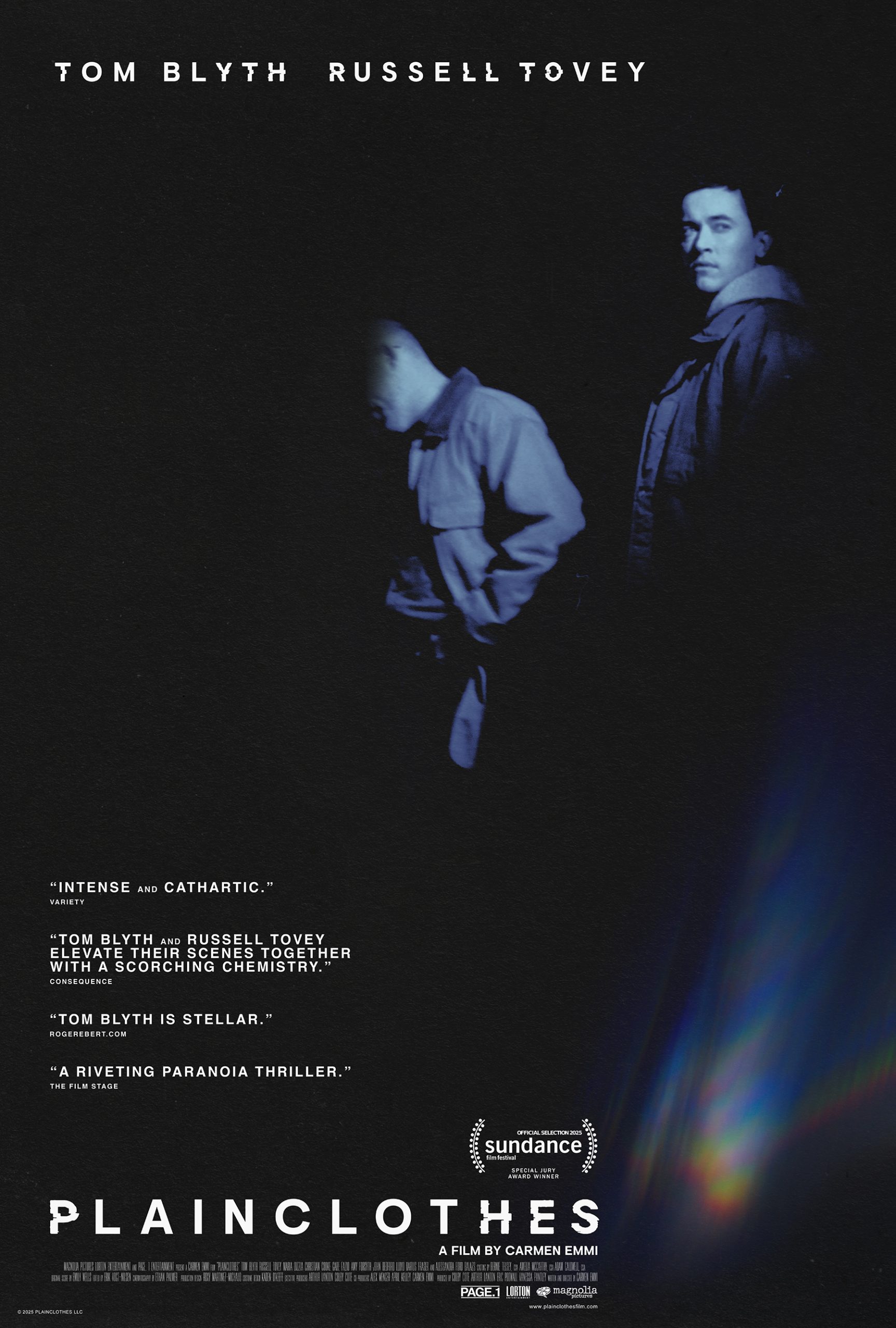
“Plainclothes” (USA/UK) (3/5); Metacritic (6/10), Letterboxd (3/5), Imdb.com (6/10), TMDB.com (6/10), Imdb.com critics review; Web site, Trailer
The LGBTQ+ community has made remarkable strides in terms of acceptance over the past five decades, a far cry from the conditions that were in place years ago. However, despite this progress, community members from various personal backgrounds and those working in certain professions have struggled with their comfort levels when it comes to being open about themselves. They have been unable or unwilling to step forward to profess their true natures to a world that has steadily become more understanding (even if there’s still work to be done in this area, as has become painfully apparent of late). Such are the conditions faced by Lucas (Tom Blyth), an undercover cop assigned to arrest (some would say entrap) gay men who cruise public spaces (particularly restrooms) looking for sex partners, ultimately nailing them on counts of indecent exposure. There’s one problem with that, though: Lucas wrestles with his own attraction to men, a leaning that has made doing his job more personally challenging. He also struggles to cope with the pressures of remaining closeted in his less-than-accepting family, particularly his hypercritical, homophobic uncle (Gabe Fazio). The ante gets upped on all of this when, on the job, Lucas encounters a handsome middle-aged man, Andrew (Russell Tovey), to whom he’s highly attracted. Andrew is something of a mystery man himself, giving off vague vibes about himself that keep Lucas at bay, despite the charged sexual energy between them, as well as the officer’s growing amorous feelings for the enigmatic stranger. The duo is ostensibly trapped at arm’s length in their own choices, but they must nevertheless contend with how to handle the undeniable attraction between them in the wake of personal and professional impediments that they’ve allowed to get in the way – and that, thanks to several ironic plot twists, end up complicating their respective lives even further. Despite the film’s seemingly plausible premise, however, the execution of this story leaves something to be desired, a problem attributable to a narrative and screenplay that could definitely use some work. For starters, the picture is set in the late 1990s, yet the paranoia level among the two leads comes across more like something out of the 1950s. Granted, circumstances in the LGBTQ+ community weren’t as conciliatory then as they are today, but, as a general rule, they weren’t as overwhelmingly oppressive and restricted as they’re depicted here. Then there are plot elements that simply don’t mesh as well as they might have. When the film’s big reveals surface, for instance, they’re often treated almost flippantly, as if they were being employed as insensitive comic relief instead of as dramatic turning points more in line with the overarching tone of the remainder of the story. And then there’s the release’s uneven pacing, marked by a dreadfully dull opening act that, thankfully, is somewhat made up for into the film’s admittedly better-handled second half. But, despite the steady improvement as the film progresses, there’s still plenty of material here that could stand some much-needed shoring up. As one of the year’s most anticipated LGBTQ+ releases, writer-director Carmen Emmi’s debut feature unfortunately comes across as a sizable disappointment, one that could have used a few more script revisions before being committed to film. When a director seeks to make a picture with a profound statement, it’s imperative that the material backs it up with a solid, factually grounded foundation befitting such an insightful observation and that it does so with eloquent, suitably fitting writing, both of which, sadly, come up lacking in this well-intentioned but ultimately flawed offering.
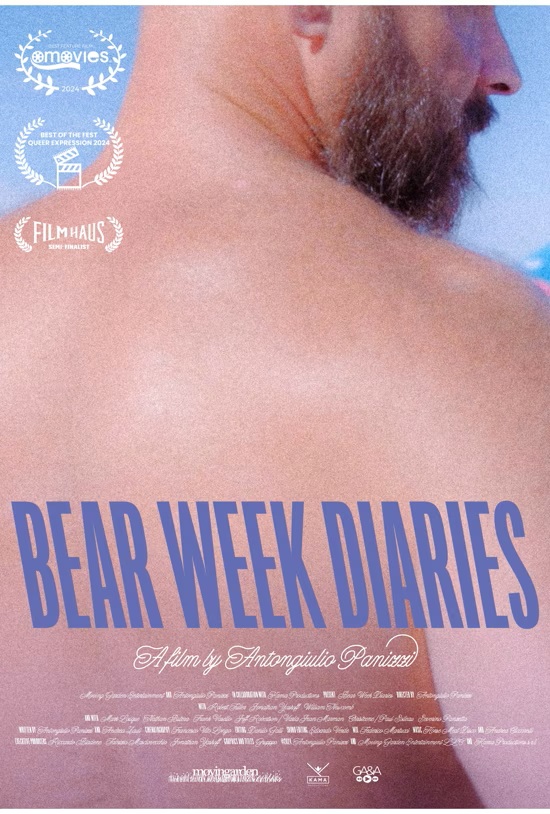
“Bear Week Diaries” (USA/Italy) (3/5); Letterboxd (2.5/5), Imdb.com (5/10), TMDB.com (5/10); Web site, Trailer
When one hears the word “Bear,” many different images come to mind, from majestic grizzlies to cuddly pandas to a Chicago football team and even a cartoon character named Yogi. But, for those in the LGBTQ+ community, the term “Bear” has a different meaning: it refers to a subculture of this diverse constituency made up primarily of big, burly, furry men known for their beards and bellies, masculine gents often compared to lumberjacks. And, despite their plentiful ranks, Bears are also largely unknown outside of the gay world (and often not especially well known inside it, either). However, their somewhat inconspicuous nature aside, Bears are famous for their well-attended unabashed social gatherings, weekend (or longer) celebrations (often called “runs”) characterized by prolific drinking, eating, dancing and erotic encounters. One of the most popular such assemblages is the annual summer congregation at Provincetown Bear Week on the tip of Massachusetts’s Cape Cod, a longtime sanctuary for those leading alternate lifestyles, including members of the gay community. And that event is now the subject of director Antongiulio Panizzi’s third feature effort, a chronicle of sorts of the weeklong pleasure-filled celebration. As a member of the Bear community myself, I’m gratified to see “my people” profiled on screen like this. However, at the same time, the end result here is somewhat disappointing. The main reason for this is the picture’s format – a hybrid documentary and narrative feature, a combination that, to be honest, is just downright … odd. That’s something I’d probably say about any film employing such an unusual format, because it’s fundamentally difficult to determine how a vehicle like this should be taken. How much of it is a documentary? How much of it is fiction? And how are viewers supposed to determine the difference when it comes to assessing the content (and, even when it’s obvious, the distinction is frequently inherently awkward)? Indeed, is the material that appears to be documentary in nature true or made up? Is the narrative content genuine fiction or the result of a filmmaker who just happened to get lucky in fortuitously capturing a dramatic real life moment? Frankly, I don’t see the point behind making a movie like this – if you want to make a documentary, make a documentary; if you want to make a work of fiction, make a work of fiction; and, if you want to make a work of fiction in a documentary style, then go ahead and do so but make the intent clear to the audience up front. This kind of deliberate ambiguity makes no sense to me. Now, with that said, the film is also not without merit when it comes to depicting certain aspects of the Bear community, its values and its events. For instance, the picture is adept at explaining how the Bear community originally arose and the principles it embodies, such as celebrating body positivity and the capacity for not being afraid to be oneself. In addition, “Bear Week Diaries” does a fine job of depicting the joyous lust for life that many Bears heartily embrace in their celebration of unbridled hedonism and shared brotherhood. At the same time, it also doesn’t hesitate to point out the downside that can accompany such activities, especially those that can result in heartache and disappointment. But, these strengths aside, the film also tends to place too much emphasis on ancillary subjects that, while part and parcel of Bear gatherings, don’t necessarily account for as much attention and activity as they’re accorded here. In addition, the director does a woefully poor job in showing the community’s ethnic diversity, inaccurately portraying it as a nearly all-Caucasian fraternity, thereby reinforcing an unfair criticism often leveled against the Bear world. Sadly, like other film projects that have unsuccessfully attempted to capture Bear community life over the years, this one again comes up short, despite its effectiveness in illustrating some of the aforementioned aspects, qualities that have been ignored, downplayed or misrepresented in previous works. Nevertheless, in the meantime, I’m still waiting for a film that truly does justice to this subject matter, something that I hope eventually materializes – but that, regrettably, hasn’t shown up yet.
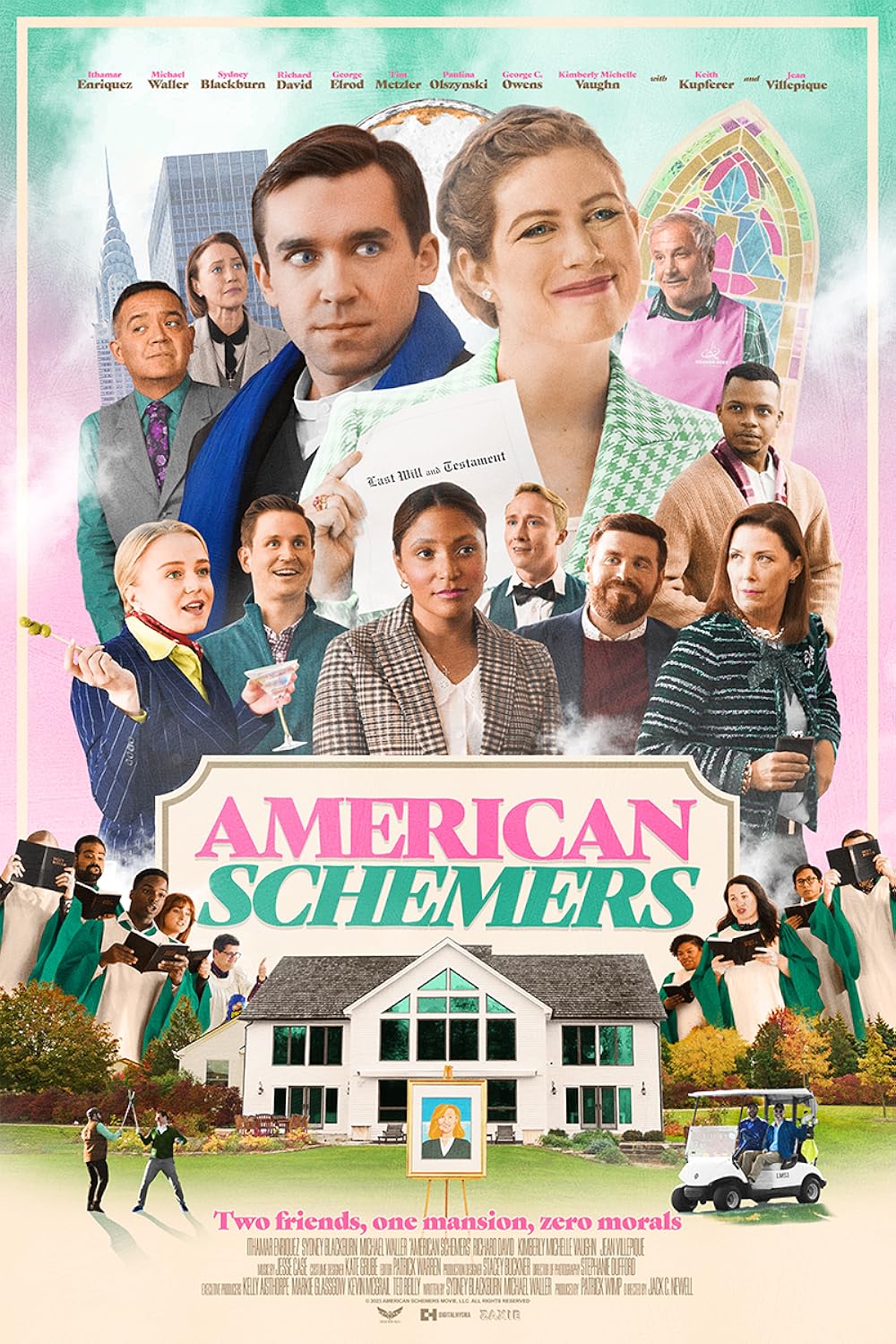
“American Schemers” (USA) (2/5); Letterboxd (2/5), TMDB.com (4/10); Web site, Trailer
When it comes to comedy, I’ll gladly stand up and applaud filmmakers who create works that knock it out of the park. But, to earn such praise, there’s a catch – their work has got to be good. To me, fewer things are worse than a big screen offering that pathetically struggles to be funny and ends up falling flat on its behind, sadly transforming itself into a bad punchline or witless pratfall. Regrettably, that’s precisely what torpedoes this latest feature outing from director Jack C. Newell, a humorless, unoriginal attempt at a comedic romp that starts out modestly entertaining but that rapidly slides into an embarrassing exercise in relentless tedium. Big Apple con artists Oly (Michael Waller) and Kara (Sydney Blackburn) operate a housecleaning company that specializes in emptying out the residences of recently deceased wealthy socialites, a scam through which they hope to discreetly pilfer valuables out from under the noses of the departeds’ unsuspecting families. Unfortunately, though, Oly and Kara never manage to pull off the big scores that they so desperately long for, and the disappointment of these underwhelming hauls is exacerbated when their former clients begin to discover that the duo was responsible for the theft of the few precious trinkets that were available. These disheartening results eventually lead them to consider giving up their scheme altogether. But, just as they’re ready to walk away, they stumble upon an opportunity for a potentially big payday when they discover that Oly is the spitting image of a disappeared heir, one who stands to inherit a lucrative estate and mansion from his late father. Given the unknown whereabouts of the missing beneficiary, all Oly needs to do is show up and pull off a convincing impersonation of the mystery man long enough to claim the inheritance and walk away a rich man. But, as Oly and Kara begin working their plan, they learn that the family and associates of the deceased are even more crooked than they are. So now what? On the surface, the picture’s premise would seem to be rife with delicious comedic possibilities. Unfortunately, however, the pair’s efforts at absconding with the ill-gotten fortune is where the film starts quickly going downhill. To put it simply, unlike the picture’s modestly entertaining prologue, the main event simply isn’t funny. The film degenerates into a silly, almost juvenile slapstick affair riddled with redundant uninspired bits that start out lame and grow progressively more annoying as the story unfolds. It reaches for laughs, even falling back on stunningly trite plot devices like a pie fight (now there’s an original idea) to try and generate chuckles. By the time I reached this point in the film, I couldn’t wait for it to end (or, should I say, for it to be put out of its misery). What’s more, I have difficulty understanding why this picture was slated for a featured screening at an LGBTQ+ film festival, given that the tangential gay connection to this story is virtually nonexistent, coming across more like a last-minute afterthought than anything else. “American Schemers” is a case where I’ve probably been more generous with my rating than I needed to be, thanks primarily to the strength of the opening act; if I had to grade it purely on what followed, though, I wouldn’t have been nearly so charitable. The real shame here is that this probably could have been a raucous tale if it had a better screenplay and narrative. As it stands now, though, it’s a victim of lazy, uninspired writing featuring stale elements many of us have already seen before. And that, unfortunately, is not comedy but tragedy.
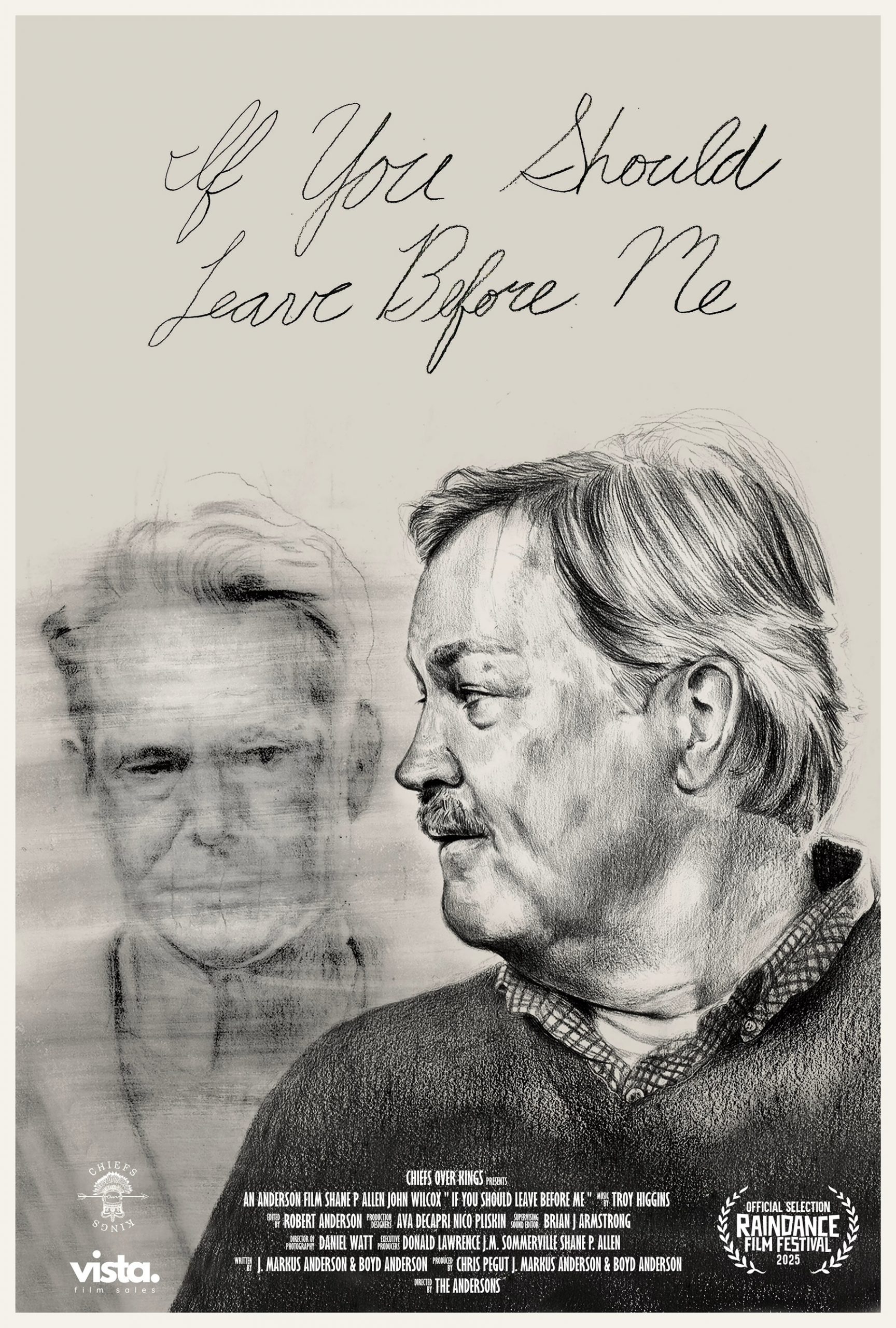
“If You Should Leave Before Me” (USA) (2/5); Letterboxd (1.5/5), Imdb.com (3/10), TMDB.com (3/10), Imdb.com critics review; Web site, Trailer
How utterly disappointing it is to watch a film implode as it plays out, declining in quality with each passing frame the further one gets into it. Unfortunately, that’s the case with the debut feature from writer-directors B. Robert and J. Markus Anderson, a picture that admittedly starts out strong and engaging but that seriously goes off the rails as it unfolds, despite a few modestly successful attempts at redemption along the way. Mark (Shane P. Allen) and Joshua (John Wilcox) are a gay male couple who serve as case workers for the recently deceased, particularly when it comes to helping them address unresolved baggage from the lives they just departed that is holding them back from successfully crossing over to the next stage of their spirits’ evolution. The duo does this by crossing through portals that appear spontaneously within their home (much of which resembles a cross between a long-established resale shop and the set of a high school drama production) and that lead them to alternate realities where their clients are stuck. The premise is an intriguing one, to be sure, and the hindrances preventing their subjects’ forward progress that are explored early on in the film do a fine job of examining the kinds of issues that the newly dead may well face as they seek to transition. However, as this release progresses, it becomes bogged down by its own narrative, going off on overlong, arguably less relevant tangents that lack the crisp, insightful dialogue and sharp narrative arcs present at the outset. Shockingly, it even veers into territory that I found patently offensive, making me wonder what the filmmakers were thinking. Besides the picture’s central case worker plotline, it also delves into the emotionally charged relationship challenges of its two leads, but, regrettably, these sequences tend to become overly talky, uninvolving, redundant and unfocused at times, despite starting out as a more engaging aspect of the film than all of the ancillary (and otherwise-easily excised) client-driven story elements. It’s almost as if the creators of this work loaded a huge pile of concepts into a hopper and threw it against the wall to see what would stick but failed to effectively eliminate anything in the process. Such a failing is frequently indicative of the work of first-time filmmakers who lack the experience and wisdom of recognizing the value (and need) of “killing one’s darlings,” no matter how much in love they might be with cherished but clearly superfluous cinematic elements. (Sadly, this even became apparent in a post-screening Q&A, when the directors as much as admitted there were ambivalencies in this offering whose existence and inclusion they couldn’t even explain themselves.) While I realize that there is a learning curve associated with the progression of a filmmaking career, it’s essential that new writer-directors recognize this and learn from it when they move on to subsequent projects. But, based on what’s in place here, it’s apparent this filmmaking duo has its work cut out for themselves going forward, particularly when it comes to incisively recognizing what’s important and what isn’t. To be blunt, my rating here is undeniably generous, as I was fully prepared to give it a lower rating while watching it unfold. However, for all of its faults, I must give kudos to this effort’s clever production design (effectively created on a virtually nonexistent budget), its inventive cinematography, a well-intentioned (if somewhat bungled) core premise, its snappy, moderately amusing dialogue (at least at the film’s beginning), and several heart-tugging sequences that help to rescue this release from its own misbegotten ways. But, when one factors in all of the material that should have been removed and that keep the film from otherwise succeeding, the result is a cinematic experience that’s thoroughly exhausting by picture’s end, a quality that nearly prompted me to leave before the credits rolled.
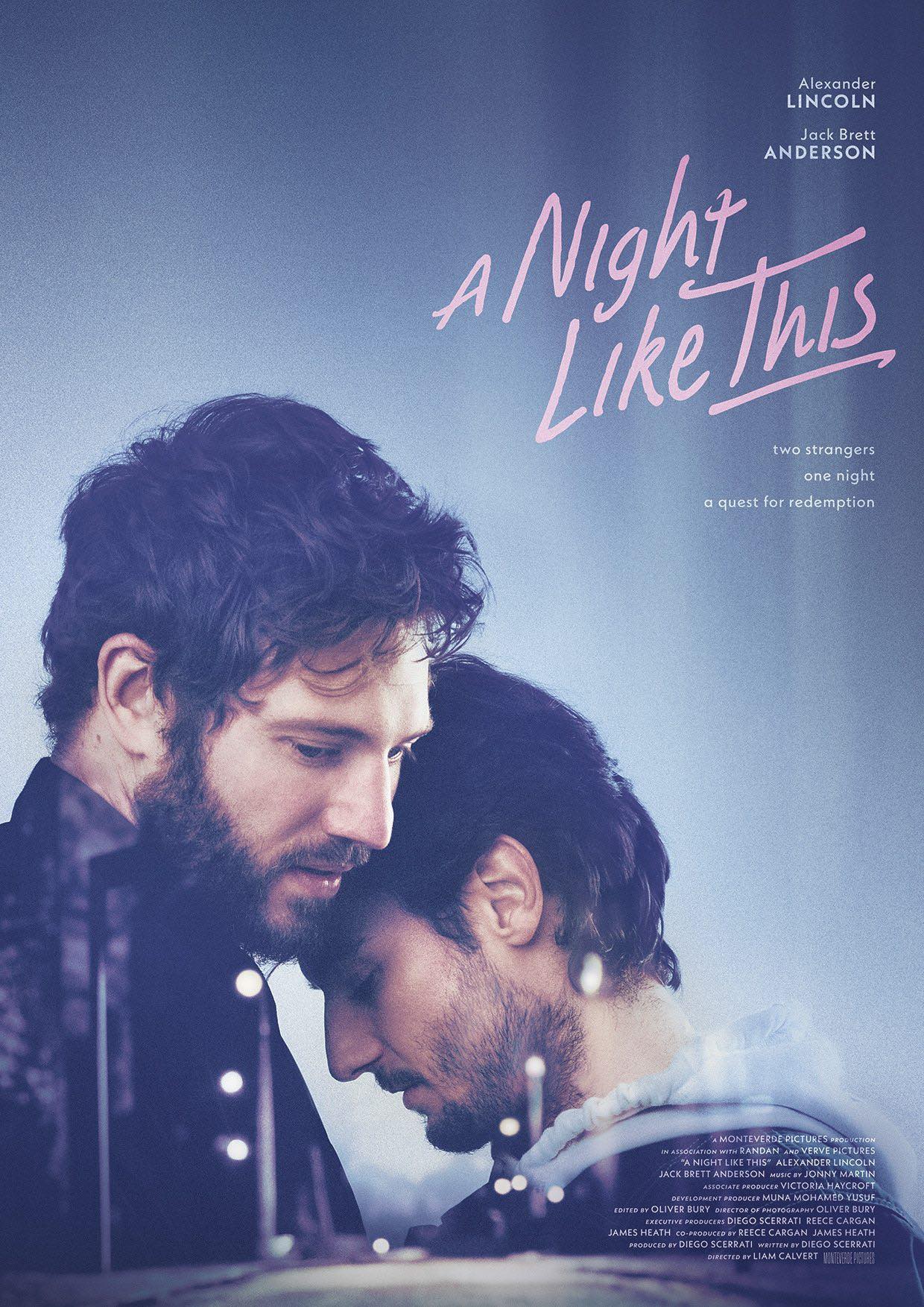
“A Night Like This” (UK) (1/5); Letterboxd (0.5/5), Imdb.com (1/10), TMDB.com (1/10), Imdb.com critics review; Web site, Trailer
I’ll come right to the point about this one: “A Night Like This” is, without a doubt, one of the worst films I have seen in quite some time. Director Liam Calvert’s debut feature follows an overnight tour of London when two lost, discouraged twentysomethings – a gay out-of-work actor (Jack Brett Anderson) and a wealthy but bumbling, sexually ambiguous entrepreneur with big plans that never seem to materialize (Alexander Lincoln) – have a chance (though, for all practical purposes, seemingly implausible) encounter in a corner pub. Their ill-conceived, difficult-to-fathom meeting inexplicably leads them into a series of extended monologues and heavily overwritten conversations about virtually everything but the kitchen sink as they explore the city on a cold winter’s night. Together they talk…and talk…and talk, barely ever stopping to take a breath or to reflect on anything they’ve just said. Simply put, it’s confounding, boring, and, above all, annoying. To be sure, crafting an engaging dialogue-driven narrative like this is indeed possible, as seen in examples like “Mindwalk” (1990) and, to a lesser degree, “My Dinner with Andre” (1981), but doing so calls for having something interesting and meaningful to say to begin with. In this case, the protagonists spend nearly two hours spewing volumes of incoherent, self-indulgent, pretentious, stream of consciousness nonsense, set against a variety of backdrops that bear little connection to the subjects being discussed, making one wonder what might have prompted these dialogues to arise in the first place. Even passing encounters with an array of colorful strangers in the course of their odyssey do little to break the stifling tedium of this overlong exercise in overblown self-loathing, whiny ennui, and rambling, half-baked philosophical prattle. To make matters worse, I never bought the faux chemistry between the two leads, probably because I never bought into the improbable character development ascribed to them, no matter how much the director desperately tries to convince viewers otherwise. And, as the picture played out, I discovered that I wasn’t alone in my impressions about this release: I witnessed viewers getting up and walking out after as little as 20 minutes (often wishing I could have joined them). In addition, as the movie unfolded, there was a noticeable drop-off in vocalized audience responses to the script’s alleged attempts at humor and high drama, and, unlike what typically followed other festival screenings, there was absolutely no applause at film’s end. While this effort admittedly tries somewhat commendably to express the existential disillusionment with life that younger generations are experiencing these days, nothing is effectively resolved as a result of this protracted discourse, leaving one essentially wondering about the intended point of all this. By all means, do yourself a favor and skip this one (unless you need the sleep).
Copyright © 2025, by Brent Marchant. All rights reserved.



